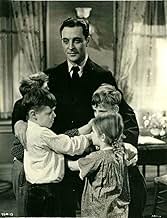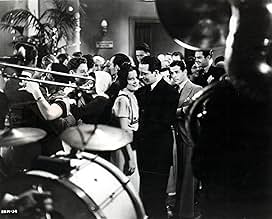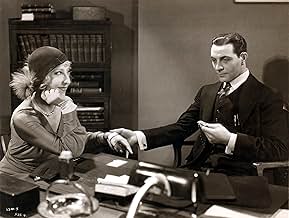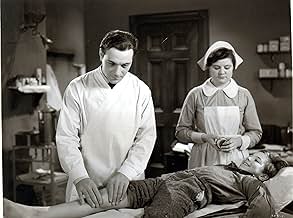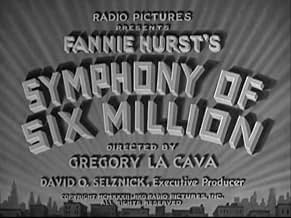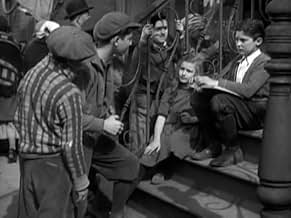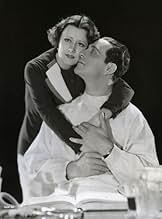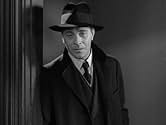IMDb RATING
6.1/10
476
YOUR RATING
A boy grows up to become a successful doctor at the expense of family relationships.A boy grows up to become a successful doctor at the expense of family relationships.A boy grows up to become a successful doctor at the expense of family relationships.
- Awards
- 2 wins total
Maurice Black
- Felix's Patient
- (uncredited)
Jesse De Vorska
- Mr. Horowitz - Hospital Patient
- (uncredited)
Harold Goodwin
- Intern at Hospital
- (uncredited)
Dorothy Gray
- Jessica - as a Girl
- (uncredited)
Julia Griffith
- Guest at Redemption Ceremony
- (uncredited)
Harry Holman
- Mr. Holman - Hospital Patient
- (uncredited)
Featured reviews
If I were picking a list of films for a Jewish film festival, Symphony Of Six Million would be right at the top of my list. Gregory LaCava directed it and with a rather florid style that probably would not go over with today's audience. Still it is quite a picture of the Jewish experience in America during the Depression years.
Ricardo Cortez stars here as an idealistic young kid who seeing the disease and poverty around him in the Lower East Side neighborhood he comes from works and studies hard to become a doctor. Cortez indeed becomes a doctor and opens a clinic in the old neighborhood.
But as his family sees it, he's too good for that. His brother Noel Madison persuades him to move uptown and start gathering a rich patient list in order that the entire family can move out and their parents Anna Appel and Gregory Ratoff can now take it easy.
Soon enough though Cortez forgets why he became a doctor with all the acclaim he now receives and the big money he commands. In the end he faces crises involving the health of two loved ones. He fails one and saves the other and possibly saves his soul as well.
One thing LaCava did was capture the Lower East Side of New York Jewish neighborhood. Appel and Ratoff were both veterans of the Yiddish theater and they really carry their parts off well. Cortez was also Jewish in real life, real name Jacob Kranz. He only got that name because he got his start playing Rudolph Valentino knockoff parts on the silent screen.
Irene Dunne is Cortez's co-star and she has little to do here as the girl who loves him since childhood. The film totally focuses around Cortez and his family dynamic.
Too melodramatic for today's audience, still Symphony For Six Million is a great picture of Jewish life in America in the not too distant past.
Ricardo Cortez stars here as an idealistic young kid who seeing the disease and poverty around him in the Lower East Side neighborhood he comes from works and studies hard to become a doctor. Cortez indeed becomes a doctor and opens a clinic in the old neighborhood.
But as his family sees it, he's too good for that. His brother Noel Madison persuades him to move uptown and start gathering a rich patient list in order that the entire family can move out and their parents Anna Appel and Gregory Ratoff can now take it easy.
Soon enough though Cortez forgets why he became a doctor with all the acclaim he now receives and the big money he commands. In the end he faces crises involving the health of two loved ones. He fails one and saves the other and possibly saves his soul as well.
One thing LaCava did was capture the Lower East Side of New York Jewish neighborhood. Appel and Ratoff were both veterans of the Yiddish theater and they really carry their parts off well. Cortez was also Jewish in real life, real name Jacob Kranz. He only got that name because he got his start playing Rudolph Valentino knockoff parts on the silent screen.
Irene Dunne is Cortez's co-star and she has little to do here as the girl who loves him since childhood. The film totally focuses around Cortez and his family dynamic.
Too melodramatic for today's audience, still Symphony For Six Million is a great picture of Jewish life in America in the not too distant past.
Like a good soup, there are many elements to this movie. You first have to start with a good stock. The stock in this movie is the Lower East Side of New York in the 30's. The hustle and bustle, the rag pickers, the pushcarts, the tailors, the fishmongers. The whole flavor of life in the Jewish ghetto. Without this backdrop the movie would fall flat.
Next are the ingredients. The cast in this movie is genuine and almost flawless. Gregory Ratoff as the father, Ricardo Cortez (Jacob Krantz) as his son - the doctor, and Noel Madison as the ambitious brother. They are all authentic and they are all Jewish. I said almost flawless because there is one flaw. Irene Dunne is cast as the love interest. She is a good actress, but she is clearly a shiksa in looks, speech, and mannerism. She stood out like a pork chop amongst the knishes and kugels.
Finally, none of this would matter if somebody didn't know how to cook. The story isn't original - as a matter of fact it is still being done today. A young boy grows up in poverty. A poor but nourishing neighborhood. He is part of a loving family which supports him in his quest to become a doctor. He succeeds and decides to devote his life to helping the underclass in the ghetto. His brother, meanwhile, becomes a successful businessman and convinces him that he should move "uptown" in order to make more money and help the family. He moves up the social ladder, becomes a raging success, and is celebrated by the rich and famous. Through a series of tragedies it becomes clear to him that he has lost his roots. It is only here,at the very end, that we have to give the director (probably at the direction of the producer David O. Selznick) a little melodramatic license. This movie was made in 1932 and drama was the order of the day.
You want subtle - watch something else. You want to choke up and feel good. Watch this.
Note: Although it was entirely unintentional, and could not have been imagined, there is an uncanny connection between the title of this movie and the holocaust which came to light a decade later. Six Million.
Next are the ingredients. The cast in this movie is genuine and almost flawless. Gregory Ratoff as the father, Ricardo Cortez (Jacob Krantz) as his son - the doctor, and Noel Madison as the ambitious brother. They are all authentic and they are all Jewish. I said almost flawless because there is one flaw. Irene Dunne is cast as the love interest. She is a good actress, but she is clearly a shiksa in looks, speech, and mannerism. She stood out like a pork chop amongst the knishes and kugels.
Finally, none of this would matter if somebody didn't know how to cook. The story isn't original - as a matter of fact it is still being done today. A young boy grows up in poverty. A poor but nourishing neighborhood. He is part of a loving family which supports him in his quest to become a doctor. He succeeds and decides to devote his life to helping the underclass in the ghetto. His brother, meanwhile, becomes a successful businessman and convinces him that he should move "uptown" in order to make more money and help the family. He moves up the social ladder, becomes a raging success, and is celebrated by the rich and famous. Through a series of tragedies it becomes clear to him that he has lost his roots. It is only here,at the very end, that we have to give the director (probably at the direction of the producer David O. Selznick) a little melodramatic license. This movie was made in 1932 and drama was the order of the day.
You want subtle - watch something else. You want to choke up and feel good. Watch this.
Note: Although it was entirely unintentional, and could not have been imagined, there is an uncanny connection between the title of this movie and the holocaust which came to light a decade later. Six Million.
... and Dr. Felix Klauber (Ricardo Cortez as the adult Felix) always seems to have the best intentions. The movie starts out showing Felix as a child studying on the doorstep of his family's ghetto tenement house, taking time to defend a local girl with a curved spine (Irene Dunne as Jessica) from some taunting street bullies. The movie spends a good deal of time focusing on Felix' home environment as a child. We learn that his parents are immigrant Jews, that his father has a kind heart but a bit of a temper, that his brother can be a trouble maker but only in the way that most boys can be, and that his mother is everything you'd want a mom to be. In other words, Felix lives surrounded by misery and poverty, but his own family is doing alright and he has a very good home. Felix is very thoughtful and decides the best way he can alleviate the misery of the poor is to become a doctor and treat everyone, regardless of ability to pay.
Unlike most childhood dreams, Felix works hard and makes his a reality. As a doctor he treats people both at his home - he still lives in the ghetto with his family - and at a local clinic set up for such work. Everybody is happy - except Felix' brother Magnus. Magnus has become a businessman, thinks everything should be for sale, and that includes medicine. He's unhappy that Felix still lives with his parents in the ghetto when he could set up a nice practice in the wealthier part of the city. Knowing his brother could care less what he thinks, he convinces their mother to beg Felix to go uptown based on the fact that their father is getting old and needs to retire. It works.
The next thing we see is Felix treating socialite women whose only problem is that they are bored and overweight, although he does get paid handsomely for it. Now everyone in the Klauber household is again happy - except Felix who realizes his talents are being wasted but just can't seem to break away from the ties that bind him to his new existence. He no longer even has time to spend with the family he did all of this for in the first place. How will all of this come out? I'll let you watch and find out.
The ending was a bit too melodramatic, but overall it was a pretty satisfying film. Another reviewer mentioned the one unusual precode element of this film - the detailed portrayal of a Jewish religious ceremony being performed towards the end of the film on Birdie's new born baby - Birdie was Felix' sister. The production code which began being enforced in 1934 only allowed Christian rituals to be shown. Another unusual element of the film - Jessica as Felix' love interest although she has a noticeably curved spine. Jessica teaches blind children and acts as Felix' link to his past and his once virtuous goals. It's almost like in the cartoons when you see a character with an angel on one shoulder whispering in one ear and a devil in the other. Jessica plays the part of the angel here, Magnus is the devil - however he's a smart enough devil to always send his mother as his mouthpiece. Who would say no to mom?
Unlike most childhood dreams, Felix works hard and makes his a reality. As a doctor he treats people both at his home - he still lives in the ghetto with his family - and at a local clinic set up for such work. Everybody is happy - except Felix' brother Magnus. Magnus has become a businessman, thinks everything should be for sale, and that includes medicine. He's unhappy that Felix still lives with his parents in the ghetto when he could set up a nice practice in the wealthier part of the city. Knowing his brother could care less what he thinks, he convinces their mother to beg Felix to go uptown based on the fact that their father is getting old and needs to retire. It works.
The next thing we see is Felix treating socialite women whose only problem is that they are bored and overweight, although he does get paid handsomely for it. Now everyone in the Klauber household is again happy - except Felix who realizes his talents are being wasted but just can't seem to break away from the ties that bind him to his new existence. He no longer even has time to spend with the family he did all of this for in the first place. How will all of this come out? I'll let you watch and find out.
The ending was a bit too melodramatic, but overall it was a pretty satisfying film. Another reviewer mentioned the one unusual precode element of this film - the detailed portrayal of a Jewish religious ceremony being performed towards the end of the film on Birdie's new born baby - Birdie was Felix' sister. The production code which began being enforced in 1934 only allowed Christian rituals to be shown. Another unusual element of the film - Jessica as Felix' love interest although she has a noticeably curved spine. Jessica teaches blind children and acts as Felix' link to his past and his once virtuous goals. It's almost like in the cartoons when you see a character with an angel on one shoulder whispering in one ear and a devil in the other. Jessica plays the part of the angel here, Magnus is the devil - however he's a smart enough devil to always send his mother as his mouthpiece. Who would say no to mom?
Several people posting reviews for "Symphony of Six Million" have made some terrific points. One is that the title of this film, about Jews in New York, eerily suggests the Holocaust - well, that's why I watched it, in fact. I didn't read the description too clearly, saw the word Jewish, and I thought it was about Jews in Germany escaping to New York. The second comment was that it is a depiction of a Jewish family that several years later would not have been done in Hollywood for various reasons.
"Symphony of Six Million" stars Ricardo Cortez, Gregory Ratoff and Irene Dunne. It's the story of a young Jewish boy, Felix Klauber (Cortez) who grows up in the ghetto wanting to be a doctor who helps the people there. All is well until he is pressured by his brother Magnus (Noel Madison) to help the family get out of the ghetto so his father doesn't have to work so hard, his sister can marry well, etc., none of which he can do working for the poor. So Felix gives up his dream and moves to the upper West Side and then to Park Avenue, becoming more and more unhappy. Then there is a tragedy, and Felix is forced to re-look at his life.
The Fannie Hurst story is dated, melodramatic and is filled with stereotypical dialogue such as "you want I should" with a sing-songy voice throughout. Yet it shows the life of an immigrant in the ghetto that moves up and manages to hold interest, mainly because the family exhibits warmth, love, humor and charm. Gregory Ratoff is terrific as Mr. Klauber. Cortez, always an affable actor, has some of the heaviest dialogue, so at times his acting seems overdone. Noel Madison as Felix's brother has the right energy for his role and is a little reminiscent of the actor Phil Casnoff. As others have pointed out, Irene Dunne isn't low-class enough as Felix's crippled girlfriend, and one wonders throughout why she and Felix didn't get married. She is so pretty as a brunette, however, and has a lovely quality.
This is the first fully-orchestrated talkie, and the music is completely distracting with its weeping violin sounds. The other distracting thing is that characters speak off camera and it sounds as if the actors are being fed lines by a director's assistant - the sound has no presence at all as it isn't miked.
What makes this film especially dated is the idea of someone becoming a doctor to work in a clinic and help people and not care about money. This may have been the America of 1932; it sure isn't now. Well worth seeing.
"Symphony of Six Million" stars Ricardo Cortez, Gregory Ratoff and Irene Dunne. It's the story of a young Jewish boy, Felix Klauber (Cortez) who grows up in the ghetto wanting to be a doctor who helps the people there. All is well until he is pressured by his brother Magnus (Noel Madison) to help the family get out of the ghetto so his father doesn't have to work so hard, his sister can marry well, etc., none of which he can do working for the poor. So Felix gives up his dream and moves to the upper West Side and then to Park Avenue, becoming more and more unhappy. Then there is a tragedy, and Felix is forced to re-look at his life.
The Fannie Hurst story is dated, melodramatic and is filled with stereotypical dialogue such as "you want I should" with a sing-songy voice throughout. Yet it shows the life of an immigrant in the ghetto that moves up and manages to hold interest, mainly because the family exhibits warmth, love, humor and charm. Gregory Ratoff is terrific as Mr. Klauber. Cortez, always an affable actor, has some of the heaviest dialogue, so at times his acting seems overdone. Noel Madison as Felix's brother has the right energy for his role and is a little reminiscent of the actor Phil Casnoff. As others have pointed out, Irene Dunne isn't low-class enough as Felix's crippled girlfriend, and one wonders throughout why she and Felix didn't get married. She is so pretty as a brunette, however, and has a lovely quality.
This is the first fully-orchestrated talkie, and the music is completely distracting with its weeping violin sounds. The other distracting thing is that characters speak off camera and it sounds as if the actors are being fed lines by a director's assistant - the sound has no presence at all as it isn't miked.
What makes this film especially dated is the idea of someone becoming a doctor to work in a clinic and help people and not care about money. This may have been the America of 1932; it sure isn't now. Well worth seeing.
The story is nice, the theme pleasant (money isn't everything), but the outstanding element is the Jewish working-class background of a non-orthodox family. Not claustrophobic like the Jazz Singer and other self-pitying films, this film has an open and sunny attitude that makes it very accessible. Excellent, warm portrayals by Gregory Ratoff and Anna Appel as the stereotypical parents.
Did you know
- TriviaAfter David O. Selznick became RKO's head of production in late 1931, he put the melodrama L'âme du ghetto (1932) (originally titled "Night Bell" after the Fannie Hurst story it is based on) into production, overseen by Pandro S. Berman. Selznick insisted that the original screenplay be rewritten to reclaim the ethnic touches from Hurst's story. Selznick likely wanted the film to serve as a mirror on to Jewish life, both of immigrants and their assimilated children. He himself changed the name of the film (a reference to New York City's population) as it was "more dramatic and dignified" than Night Bell. He also directed RKO music department chief Max Steiner to use symphonic music for the score and to have music throughout the picture. This was innovative as "talkies" rarely had an extensive score.
- GoofsAs is often the case when showing a devout Jewish home, a menorah, the traditional candelabrum, is displayed. However, this is used only once a year, so for the rest of the year it is put away. Having it on show is like having a Christmas tree up all year round to show that the family are Christians.
- Quotes
Dr. Schifflen: My boy, there are two kinds of men in our profession. Some are gifted with the spark of genius; some of us are... just doctors.
[walks to the door and opens it, then turns back toward Felix]
Dr. Schifflen: Felix Klauber, you're more capable than I, but if you don't go through with this operation, I will.
- ConnectionsFeatured in David O. Selznick: 'Your New Producer' (1935)
Details
- Release date
- Country of origin
- Languages
- Also known as
- Symphony of Six Million
- Filming locations
- Coney Island, Brooklyn, New York City, New York, USA(amusement park)
- Production company
- See more company credits at IMDbPro
Box office
- Budget
- $270,000 (estimated)
- Runtime
- 1h 34m(94 min)
- Color
- Aspect ratio
- 1.37 : 1
Contribute to this page
Suggest an edit or add missing content

